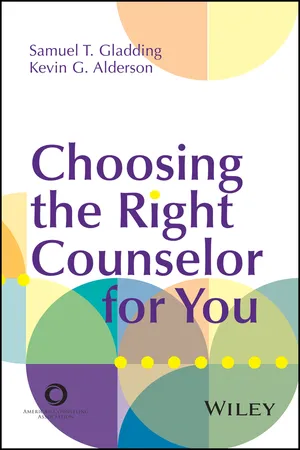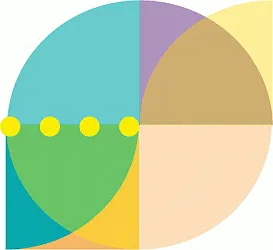
- English
- ePUB (mobile friendly)
- Available on iOS & Android
Choosing the Right Counselor For You
About this book
This concise guide is for individuals seeking a counselor for themselves or others. It contains a treasure trove of information for the public on the nuts and bolts of counseling in an easy-to-read, question and answer format. Chapter topics include how to know when to seek help and what kinds of issues counselors assist with; the differences between individual, group, couples, family, and online counseling; the various theoretical approaches to counseling and how to choose; how to find a competent counselor; what questions you should ask before scheduling your first appointment; and how to determine if counseling is working.
*Requests for digital versions from ACA can be found on www.wiley.com
*To purchase print copies, please visit the ACA website
*Reproduction requests for material from books published by ACA should be directed to [email protected]
Frequently asked questions
- Essential is ideal for learners and professionals who enjoy exploring a wide range of subjects. Access the Essential Library with 800,000+ trusted titles and best-sellers across business, personal growth, and the humanities. Includes unlimited reading time and Standard Read Aloud voice.
- Complete: Perfect for advanced learners and researchers needing full, unrestricted access. Unlock 1.4M+ books across hundreds of subjects, including academic and specialized titles. The Complete Plan also includes advanced features like Premium Read Aloud and Research Assistant.
Please note we cannot support devices running on iOS 13 and Android 7 or earlier. Learn more about using the app.
Information

the chances we didn't take.”

Chapter 1
When to Seek the Help of a Counselor
Why Should I Seek a Counselor in Particular, or at All for That Matter?
How Would I Know If I Should See a Counselor?
- Your emotions are intense or they feel all messed up. A strong indicator that you should consider getting professional help is if you feel constantly irritable, sad, depressed, hopeless, or dismayed. Maybe you find that you are overreacting to minor events, such as someone being late for an appointment or not showing up for meeting. Perhaps you cannot shake the funk that you are in no matter how many people show concern for you. Alternatively, maybe you have become overly critical, cynical, and self-centered. You ruminate about the past and the mistakes you have made. These signs and others like them indicate you should see a counselor. When you are not managing your emotions very well, it results in affective changes (e.g., your feelings are different than before), behavioral changes (e.g., the way you now act is atypical or abnormal for you), and cognitive changes (e.g., you view yourself more negatively than before).
- It is worse now than it was a month ago. The problem is getting worse instead of better. Regardless of your best efforts, you continue to struggle with the same old thing. For example, your insomnia keeps getting worse. Increasingly, it takes longer to fall asleep, or you continue waking up earlier. You find yourself drinking more than you used to, and you are not successfully controlling it. Attending college is not working out for you because you keep missing your classes. On top of that, you cannot seem to sit down and study.
- The problem just does not stop! No matter what you do, it lingers like a bad case of puppy love, an indigestible dinner, or too many raw onions. You have tried everything you can think of but the problem remains. For example, maybe you experience so much anxiety in a social situation or when giving a talk in front of others that you give up trying. Like hitting your head against a brick wall, the only thing that changes is your head, which gets increasingly sore. Some people feel so much loneliness and isolation that it becomes crippling. You are worthy of love, and you deserve to feel a sense of community. However, doing so requires dedication and sometimes change from within.
- You feel alone and isolated. There are times in life when we feel alone and isolated. Sometimes this occurs when we relocate to find work or to help ailing parents, and other times we may feel alone and isolated even though we are surrounded by people. Seeing a counselor can help us regain our perspective and perhaps inspire us to take the necessary steps to create a sense of community and belonging.
- You are uncomfortable with your life or the direction you are heading. Despite our best efforts, sometimes we lose sense of what is important to us, or we make decisions that we later feel were misguided or outright wrong for us. Most decisions result in both positive and negative consequences, and weighing these, especially ahead of time, is not easy.
- You have become stuck. Sometimes we just do not know how to get out of a situation that looks bleak no matter what direction we take in life. This kind of dilemma is called an avoidance-avoidance situation (e.g., being in a horrible marriage but having children to think of and going it alone seems financially impossible).
- You were abused as a child or traumatized by something that happened. Traumas take many forms but the one thing they have in common is how much they can mess up the way we function psychologically, socially, sexually, and in other areas of our lives.
- You are constantly fatigued or experience another condition that may have both a psychological and physical component. There is a powerful connection between the mind and the body. Many illnesses, for example, have both physical and psychological aspects. Some doctors call these psychosomatic conditions. Many physical conditions such as headaches, stomachaches, neck pain (some people are literally a pain in the neck!), and back pain occur in direct response to stress. After you have been thoroughly assessed by a physician to rule out any possible medical diseases, you will probably want to see a counselor to look at contributing factors in your life or in the way you live your life.
- Others are telling you to get help. Maybe you do not realize there is a problem but the people who know you are telling you to get help. For example, a person with a substance use disorder denies their addiction despite the facts. Denial is such a powerful defense mechanism that it keeps people from seeing the truth about their excessive use of alcohol or drugs or their compulsive behavior. Some individuals are getting hooked on video games, smartphones, and Facebook. If your friends and family keep telling you that they think you need help, we advise you to pay attention to what they are saying to help you realize something about yourself.
- Others at work have noticed a change. When your boss at work tells you to get help, either he or she has it out for you or maybe you really do have an issue that needs to be addressed. As we stated in the previous point, sometimes other people see problems before we can.
Table of contents
- Cover
- Title Page
- Copyright Page
- Dedication Page
- Table of Contents
- About the Authors
- Introduction
- Chapter 1: When to Seek the Help of a Counselor
- Chapter 2: The Types of Counseling Practice
- Chapter 3: The Various Approaches to Counseling Practice
- Chapter 4: How to Choose a Counselor or Other Mental Health Clinician
- Chapter 5: The Questions You Should Ask a Counselor Before Making Your First Appointment
- Chapter 6: How to Assess Your Progress
- Epilogue
- Appendix A: Forms for Setting Goals, Determining Expectations, and Creating an Agenda
- Appendix B: Theories Underlying 10 Counseling Approaches
- Appendix C: Reflective Outtake Counseling (ROCK)
- End User License Agreement